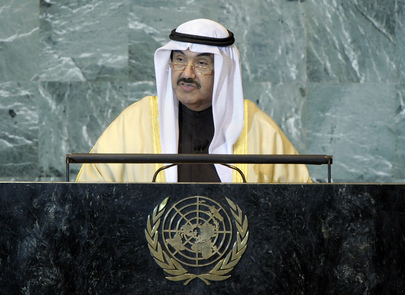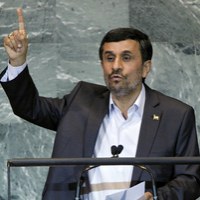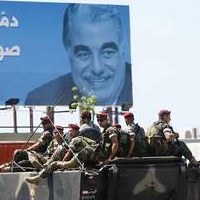![]()
Thu, Sept 22, 2011 | UN TV

Sheikh Naser Al-Mohammad Al-Ahmad Al-Sabah, Prime Minister of the State of Kuwait (UN Photo/Marco Castro)
Sheikh Naser Al-Mohammad Al-Ahmad Al-Sabah Addresses the General Debate of the 66th Session of the General Assembly
Address by His Highness Sheikh Naser Al-Mohammad Al-Ahmad AL-SABAH, Prime Minister of the Republic of the State of Kuwait at the General debate of the 66th Session of the General Assembly of the United Nations (New York, 21-24 and 26-30 September 2011).
Kuwait, General Debate, 66th Session
STATEMENT
BY
HIS HIGHNESS SHEIKH NASSER AL MOHAMMAD AL AHMAD AL SABAH
PRIME MINISTER OF THE STATE OF KUWAIT
BEFORE THE
SIXTY-SIXTH REGULAR SESSION OF THE
UNITED NATIONS GENERAL ASSEMBLY
UNITED NATIONS HEADQUARTERS
NEW YORK
THURSDAY, 22 SEPTEMBER 2011
In the Name of Allah, the Merciful, the Compassionate, Peace & Prayer be upon
the Prophet Mohammad, Master of the Mursaleen
and all His family and companionsMr. President,
Your Majesties & Highness
Your Excellencies, Heads of State and Government,
Ministers, Permanent Representatives and Ambassadors,Ladies & Gentlemen:
At the outset, it is my pleasure, to personally extend to you, Mr. President, on behalf of the government and the people of the State of Kuwait my most sincere congratulations on your unanimous election President of the 66th Session of the General Assembly. This represents an acknowledgement and appreciation of the prominent stature of the brotherly State of Qatar, which has strong links and distinguished relations with my country Kuwait.
I am certain that you shall conduct the works of this Session in a manner which will achieve the desired success.
We also would like to pay tribute to the efforts of your predecessor Mr. Joseph Deiss on his distinguished presidency and his successful conduct of the works of the previous session.
We congratulate His Excellency Mr. BAN Ki-moon on his re-election as Secretary-General of the United Nations and wish him continued success.
We were pleased to see the State of South Sudan join the United Nations. This state received the recognition of Kuwait on the first day of its independence. We are confident that the Government of South Sudan and its friendly people; of whom we are proud of our relations with them; will achieve security, stability and economic development for their country.
Mr. President,
There is no doubt that as the time passes, the importance of our Organization increases. Over the past six decades, the international arena have witnessed numerous events and developments, that have had a direct impact on international peace and security. The United Nations being the most legitimate, credible, and independent multilateral international mechanism has managed to be a safe haven for the member states seeking joint and united solutions to face a number of questions and crises. Hence, there is a conviction, that no one country alone, no matter how powerful and capable it may be, can face the dangers of terrorism, proliferation of weapons of mass destruction, the phenomenon of climate change, epidemics, organized crime or any of the other challenges that the geographical and national borders can no longer constitute a barrier to prevent their transit, spread or impact. However, the role of the United Nations, during the past years has grown significantly. Particularly, in the face of the humanitarian disasters that we witness, whether these are man-made or natural. Perhaps the latest example on this is demonstrated by the action taken by the United Nations in face of the famine that is affecting the Horn of Africa region; due to severe drought and violence in mobilizing humanitarian aid and providing emergency assistance to those in need; have contributed in the alleviation of suffering and saving the lives of millions.
This ever increasing importance of the United Nations in our world today necessitates improving and strengthening its capabilities, as well as advancing its performance. This in turn, requires taking steps and measures to reform its major bodies, such as the General Assembly, the Security Council and the Economic and Social Council, as well as developing their functions to enable them to carry out these functions and responsibilities effectively. Therefore, all member states have a responsibility to support the United Nations, commit to implement its resolutions and provide it with the needed financial resources in a timely manner without any conditions. Since the ultimate result is that the power of the United Nations is but a reflection of the extent of support of its members to its noble objectives and the fulfillment of its needs.
Mr. President,
The developments and events that the Middle East region is currently witnessing are indeed a source of great concern and forewarn of further deterioration to the security and stability of the region. The use of force and acts of violence that have claimed the lives of thousands must cease, to prevent further bloodshed. The legitimate demands of the peoples for implementing serious and prompt political, economic and social reforms must be heeded. In this respect, the State of Kuwait supports all the efforts that call for dialogue, understanding and the rejection of violence.
The State of Kuwait attaches great importance on consolidating and developing its relations with its neighbours on firm and solid grounds, based upon mutual respect and common interests, as well as promoting these relations to the level that meets the aspirations of the peoples of the region. In this context, the State of Kuwait calis upon the Islamic Republic of Iran to take serious and real confidence-building measures, represented in adhering to the resolutions of international legitimacy as well as cooperating with the International Atomic Energy Agency, to dispel the fears and doubts that surround its nuclear programs, in addition to its positive cooperation to resolve the dispute over the occupied Emirati islands according to the principles and rules of international law.
Mr. President,
This year, the State of Kuwait celebrated the 50th Anniversary of its independence and the 20th Anniversary of its liberation from the Iraqi Saddami occupation. This liberation was truly considered as one of the most outstanding successes of the United Nations in its endeavours to deter aggression and remove its effects, based on the principles of the Charter and the resolutions of international legitimacy.
In this coming month of November, Kuwait will also celebrate the 50th Anniversary marking the issuance of its Constitution, which codified democracy that has become an inherent part of the State of Kuwait since its establishment. This is considered one of the most outstanding achievements of Kuwait as a Government and as a people. These are all historic occasions for a small peace loving country that believes in the principles and purposes of the Charter and of international law. A country that relies in its relations on the respect of the principles of sovereignty, independence and non-interference in the internal affairs of others, as well as the settlement of all differences by peaceful means.
The State of Kuwait also seeks to get over its painful memories through the establishment of strong relations of cooperation, mutual respect and good
neighbourly relations with the brotherly Republic of Iraq, where we hope peace and stability will prevail there, and further progress in the endeavours and efforts exerted to enforce security and rebuild the economy, which has been destroyed by the former regime aggressive and expansionist policies, will be achieved. Hence, we would like to renew our commitment to provide all sorts of support, to assist Iraq implement its remaining international obligations as provided by the relevant Security Council resolutions, which would enable Iraq to regain its role in its regional and international environment.Mr. President,
Six decades have passed, and the United nations still stands incapable of finding a solution to the Palestinian Question and putting an end to the Israeli occupation of Arab territories. Worse yet, the suffering of the Palestinian people exacerbate further as the years pass. Their economic and social conditions worsen, the settlements expand, their land confiscated, their water stolen, their areas are besieged, their movements are restricted, and their sons and daughters are imprisoned. What really evokes concern is that the International Community stands as a spectator of all these Israeli practices and policies, without opposing or deterring them, despite their clear contravention and violation of the most simple rules of international law and the resolutions of international legitimacy, let alone their undermining of the chances to achieve peace. Perhaps the inhuman practices of Israel against the brothers in Gaza, such as the totally unjustified blockade and the deliberate destruction of the infrastructure despite the continued international condemnation against them, are but a shining example of Israel’s indifference towards its responsibilities and towards the world’s public opinion.
The international community is therefore required to continue its endeavours and efforts to pressure Israel to enable the Palestinian people to obtain their right to self determination, the establishment of their state on their land, with East Jerusalem as its capital, as well as end the Israeli occupation of all the Arab territories it occupied after 4 June 1967, including the Syrian Golan, and cease its continued violations of the sovereignty of Lebanon and withdraw from all its occupied territories.
Here, we wish to renew our full commitment and support to the bid of the Palestinian Authority and its endeavours to obtain membership in the United Nations as an independent and full member state.
Mr. President,
The State of Kuwait welcomes the international reports the United Nations and its agencies issue about what was achieved of the Millennium Development Goals adopted by the 2005 World Summit. We can all be proud of the accomplishments in the field of reducing the number of persons infected with HIV/AIDS, as well as other communicable diseases, like Malaria and Tuberculosis.
However, and despite of all these accomplishments, there remains a lot for all of us to do, since these accomplishments were unbalanced and uneven between one state and another. There are many indicators that confirm the inability of some states to reach the Millennium Development Goals by 2015 for many reasons, perhaps the most obvious of which is the global economic and financial crisis and its negative impact that reached the majority of the states, big and small, rich and poor. However, the developing countries and the least developed countries were the ones that suffered the most, due to the weakness and vulnerability of their economies. Their economic growth has decelerated; the volume of their exports has decreased, while the rates of unemployment have risen. At the same time, the prices of foodstuff and basic commodities have risen, which led to the exacerbation of the economic and social impact of the crisis. As soon as the world started its recovery from this economic crisis, the symptoms of another began to emerge, threatening once again to affect the growth of the global economy. This crisis is represented by the problem of the sovereign debts of the United States of America and a number of European countries.
The international community is required to forge ahead in restructuring the international financial institutions in order to ensure their suitability with international reality, improve their abilities to perform their duties effectively and efficiently, as well as making them more representative of, and fair to the countries that need their support.
The world today is in dire need for a just and balanced global trade system, that bridges the enormous gap between states, achieve mutual benefit and assist in integrating the economies of the poor countries within the global economic system. The developed countries must also fulfill their commitment and increase their official development aid to reach the level of 0.7% of their GOP, which is the percentage agreed upon internationally.
In this context, the State of Kuwait did not spare any effort to provide emergency humanitarian assistance to states stricken by natural disasters, or to respond to appeals by the United Nations or its agencies to alleviate the suffering of the peoples of these states. Out of its belief in the importance of the role of the United Nations in the field of humanitarian assistance, the State of Kuwait has increased its voluntary contributions to a number of international organizations and specialized agencies, such as the High Commission for Refugees, the United Nations Central Emergency Fund and the International Committee of the Red Cross.
Despite the fact that the State of Kuwait is a developing country, it has, since its independence in 1961, followed a constant path and policy to stand by the developing countries and the least developed countries, by extending a helping hand and providing humanitarian and development assistance, whereby over a 100 countries all over the world have benefited from such assistance that have exceeded the amount of 15 billion dollars.
The Amir of the State of Kuwait has launched several initiatives; these initiatives are: The Decent Living Initiative, The Initiative to Support Small and Medium Size Projects, The Initiative to Develop Eastern Sudan, with a view to alleviate the suffering in many countries affected by the increase in the prices of foodstuff and energy, as well as those countries whose economies were affected by the global financial crisis and have witnessed an increase in the rates of unemployment and poverty levels. Many countries have indeed benefited from those initiatives.
Mr. President,
The United Nations; through the numerous conferences it has organized, the international conventions and agreements it has concluded, in addition to resolutions and statements it has adopted; was able to unite our visions, guide our endeavours, and mobilize our resources and our potential to consolidate our joint work to combat corruption, strengthen the rule of law and good governance, respect human rights as well as empowering women and bolstering their role in society. We look forward for a more effective international role within the context of the Alliance of Civilizations Initiative, in order to intensify the dialogue between the various civilization, religions and cultures, disseminate the values of tolerance, moderation and mutual respect as well as reject the expressions of violence and extremism, which undermine and reduce our chances of working together to spread the culture of peace and reach the noble principles and purposes of the Charter of our organization.
Thank you, Mr. President.



 RSS
RSS
















Sheikh Naser Al-Mohammad Al-Ahmad Al-Sabah Addresses the General Debate of the 66th Session of the G http://t.co/oG3v1vh3
Sheikh Naser Al-Mohammad Al-Ahmad Al-Sabah Addresses the General Debate of the 66th Session of the G http://t.co/oG3v1vh3